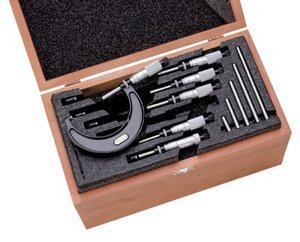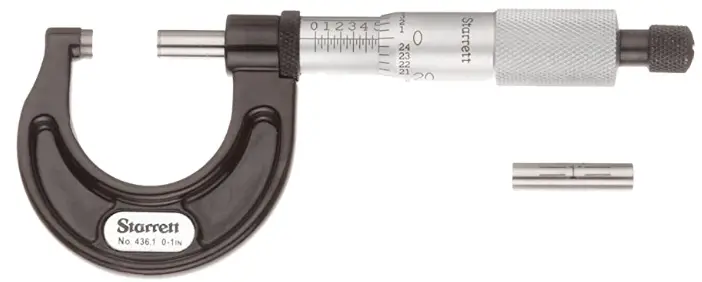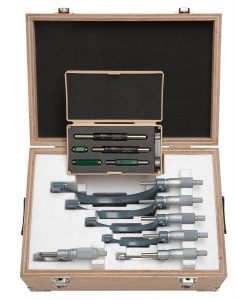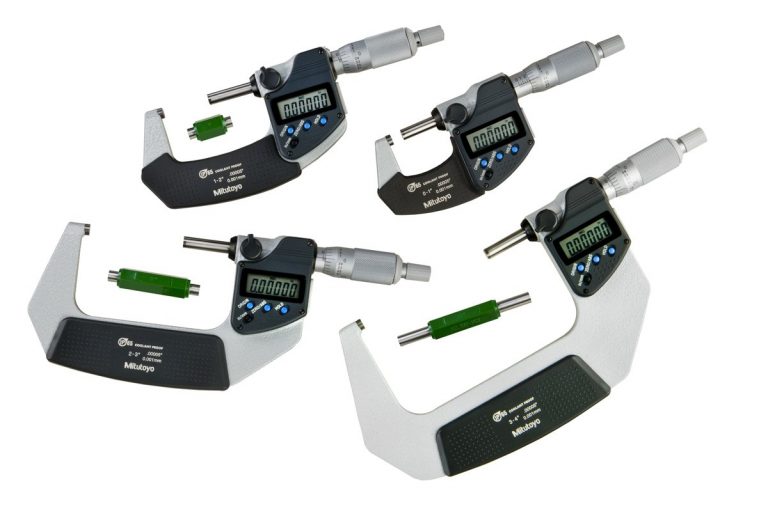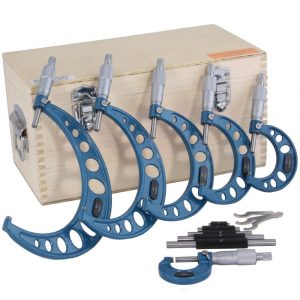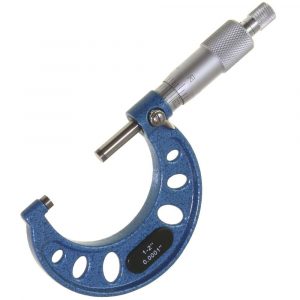Not many tools get as much inspection use as a micrometer. As a result, the first inspection tool purchased by many is a good micrometer or a micrometer set.
Because of their expense, they are not tools that you will want to buy more than once. The good thing is that if chosen carefully, they will last a lifetime or more. As the saying goes, “buy once, cry once”.
Now take a look at the best micrometer sets available, many of which have been best in class for many, many years.
Table of Contents
ToggleBest micrometer set
Starrett ST436.1CXRLZ 0-6" Outside Micrometer Set
When it comes to the standard analog micrometers, nobody makes them like Starrett. The most important aspect of a micrometer is its accuracy and these mics by Starrett are extremely accurate and repeatable.
As long as you exercise due care in your measurements, you can expect them to be accurate to .0001”. While it is true that many other manufacturers have been able to create a tool that is capable of the same accuracy, few come close to the build quality of a Starrett micrometer.
It can be hard to quantify the “feel” of a tool. In this case, these mics just feel right. The weight is nice without being too heavy. More importantly, they have a nice balance to them that never seems to get in the way of your measurement.
The finish of both the frame of the micrometer as well as the sleeve has always been excellent. The knurling on the thimble and ratchet provides the perfect amount of grip.
Speaking of the ratchet, I have always found that Starrett makes the best ratchets. Ratchet preferences can vary from person to person but the thing that is nice about these ratchets is they are extremely consistent. Between mics in a set, the ratchets will all feel the same.
Starrett has been making these same micrometers for quite some time and largely without change. If it ain’t broke, don’t fix it.
The one downfall of these micrometers is that the quality does come with a price. For this reason, I have included a second choice in the Mitutoyo set below. It can also be worth considering the best digital micrometer set if you need more accuracy and can live with a smaller measuring range.
Used versions of these tools can be an excellent choice also because all of the choices noted here, from both Starrett and Mitutoyo, have a long history of being quality measuring tools. They have been mostly unchanged through the past couple decades.
As a side note, the case that comes as part of the set is as well made as the micrometers themselves.
This set of micrometers form Mitutoyo checks all the boxes. They are accurate, consistently well-made and reliable. They are only a small step below the set by Starrett. While they might not be the absolute best micrometer set available, they might be the best value because the price is substantially lower than that of the Starrett set.
For comparisons sake, if the micrometer set from Starrett is a Rolls Royce, then the set by Mitutoyo is a Cadillac. This is certainly reflected in the price difference.
The main difference between the sets is in the feel of the mics. The finish of the Mitutoyo set is nice, but not on the same level as that of the Starrett set. Also, I have always found the ratchet mechanism and balance of the mics by Mitutoyo to be very good but not as great as the Starretts.
I feel like this might sound like the Mitutoyo set is not that great but in reality, they are excellent. They just aren’t quite as good as the Starretts. However, they are much better than all the other micrometers out there and they come with a much smaller price tag.
Best digital micrometer set
Mitutoyo 293-961-30 Digimatic Micrometer 0-4”
I absolutely love the Mitutoyo Digimatic micrometers. They are easily the most accurate normal micrometers out there. Sure, you can find specialty mics with indicators built in that will be more accurate, but they will be more expensive and less user friendly.
If given the choice, I would use Mitutoyo Digimatic mics for all micrometer measurements. They are quick to read and extremely accurate.
The only knock I could give them is that some might find them a little bulky. Personally, I have never found this to be the case, but they are larger than your average analog mic.
Digital micrometers also make a great choice when working in both inch and metric units. The ease with which they switch measuring units saves time and eliminates any potential conversion miscalculations that might occur by the user.
Another great feature of the Digimatic mics that is not common among other digital micrometers is that the batteries seemingly last forever. No, not literally but even with heavy use it feels like it.
The sole reason they didn’t make the best overall micrometer set is that the set includes less micrometers and is limited to measuring sizes up to 4”. If this isn’t a problem for your applications then think about taking a good, hard look at the Mitutoyo Digimatic mic set. They are an absolute top of the line set.
Best budget micrometer set
Anytime Tools 0-6” Outside Micrometer Set
In recent years, some of the Chinese made micrometer manufacturers have greatly increased their quality. Anytime Tools is a prime example of this. They have been able to create tools for a fraction of the price of a traditional micrometer while largely maintaining the accuracy and quality seen with more well-known manufacturers.
The improvement in Chinese made micrometers is so great that some American tool manufacturers have been outsourcing their tools to other countries.
With regards to accuracy, they claim to be accurate to .0001” as you would expect from a good micrometer. In practice, they aren’t quite there all the time. It would be safe to count on .0002” accuracy. If you are looking for more than that then make sure to verify the accuracy when you receive them.
The Anytime Tools set comes with all the standard micrometer set accessories including reference standards for verifying their accuracy and a wooden case. The case isn’t as nice as what comes with more expensive sets, but it is just a box after all. It holds all of the included mics and closes to keep out the elements. It makes a perfectly acceptable storage solution.
The feel of this set isn’t quite as nice as those from Mitutoyo and Starrett but the reduction in price can not be overlooked. This set could be purchased along with a set of gage blocks to verify their accuracy and the price tag would still be well under the cost of other quality sets.
I would never recommend going cheap when it comes to your precision measuring tools if they are critical to your job. The one exception is, if you are a hobbyist or just entering the machining trade, this micrometer set from Anytime Tools makes a great starter set that just might meet all of your current and possibly future measurement needs.
Things to consider when purchasing a micrometer set
How big of a set to get
It all comes down to the sizes you plan to measure. Usually, the required measurements are skewed towards the lower end of the measuring scale. A 0-1” micrometer will be the size used most often. The 1-2” micrometer will be the 2nd most used micrometer and so on.
As the sizes get larger, they will see substantially less usage. Even in a high use environment such as a machine shop, a 5-6” micrometer or 11-12” micrometer will rarely be used.
My recommendation would be to not buy a larger set than you need. A good micrometer set is not cheap and therefore you should ensure the tools will get used. You don’t want a box full of expensive paperweights.
Unless you know that you absolutely need it, I would never recommend purchasing a set larger than 12”. A 0-6” set makes a good starting point for most people and if you think you can get away with something slightly smaller then go for it.
It is better to buy a higher quality 0-3” set than it would be to have a 0-6” set where the 4-6” mics never get used.
Accuracy
Accuracy and repeatability are the most important qualities in a micrometer. It is possible to find a wide variety of accuracies available in micrometer, especially when it comes to older used tools.
You should look to get a micrometer with an accuracy of .0001” or better. I have included a cheaper, slightly less accurate budget set above, but you should only go with that set if price is your primary concern and you know that the reduction in accuracy is acceptable for your measurements.
I have never known anyone to regret purchasing a more accurate tool.
Analog vs mechanical counter vs digital
Each type of micrometer has its pros and cons.
Analog mics are always ready to go. You never need to worry about dead batteries and aren’t quite as susceptible to contamination (coolant, etc.) when compared to digital micrometers.
Digital micrometers are easier to read, quicker to take measurements and allow the user to easily switch between measurement units. Additionally, they allow the user to switch their zero location at will. There are many instances were comparison measurements need to be taken. Digital micrometers allow these types of measurement to be taken quickly without the added need for manual calculations.
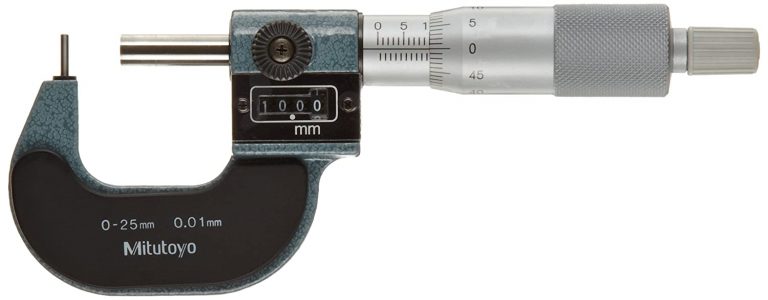
I do not recommend the mechanical counter micrometers. They add another mechanism that can malfunction simply don’t provide enough of an added benefit to justify their use. Electronic digital micrometers can be found for the same price as the mechanical counter versions.
Go with a standard analog micrometer or a solid digital version and skip the prone mechanical counter varieties.
Cases
Cases are all about protection. You don’t need anything too fancy when it comes to cases. The standard wooden case that comes with most micrometer sets is more than capable of storing your tools.
The case gives the tools a place to stay with protection from the elements (there can be a lot in the air when machining) and also a safe storage option. Too often a micrometer left on a workbench gets bumped and ends up hitting the floor.
Keep your tools safe and make sure to put them away when not in use so they remain accurate for years to come.
Carbide vs steel tips
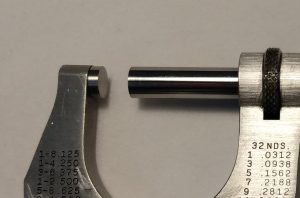
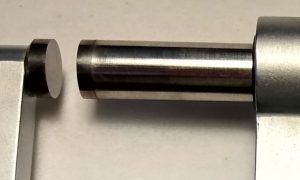
Carbide tipped micrometers provide increased wear resistance. In general, I have not found them to provide an added benefit to hardened steel.
Please note that carbide can be more brittle as a result of the added toughness which means they are susceptible to chipped measuring faces. If cared for properly, this will likely not be an issue, but it is something to keep in mind.
The main case for carbide tips would be when dealing with particularly abrasive materials.
For most users, both carbide and steel tipped micrometers will be more than adequate.
Calibrated or not
There are manufacturers and sellers out there who offer calibrated micrometers for an added cost. This is not an item that is worth paying extra for.
The micrometers should be made accurate from the start. Calibration only gets you documented evidence that your tool is verified as accurate using a reference standard that is traceable to NIST. If this is something you require then you likely already have a set of calibrated gage blocks that will allow you to do the calibration on your own.
Shipping companies are not always gentle with your packages so keep in mind that it would be entirely possible to pay extra for calibration and have the calibration voided by shock from shipping.
Skip the calibration upcharge and verify your micrometers on your own.
Summary
Choosing a micrometer set is not an easy decision. Even the cheapest options cost a pretty penny. The most important things to consider is the accuracy you need as well the size of the set you require.
If they will be used daily, don’t be afraid to splurge and pick up a heirloom quality set from Starrett or Mitutoyo. They really are worth it and built to last.
Related articles
For more information check out these related articles:
